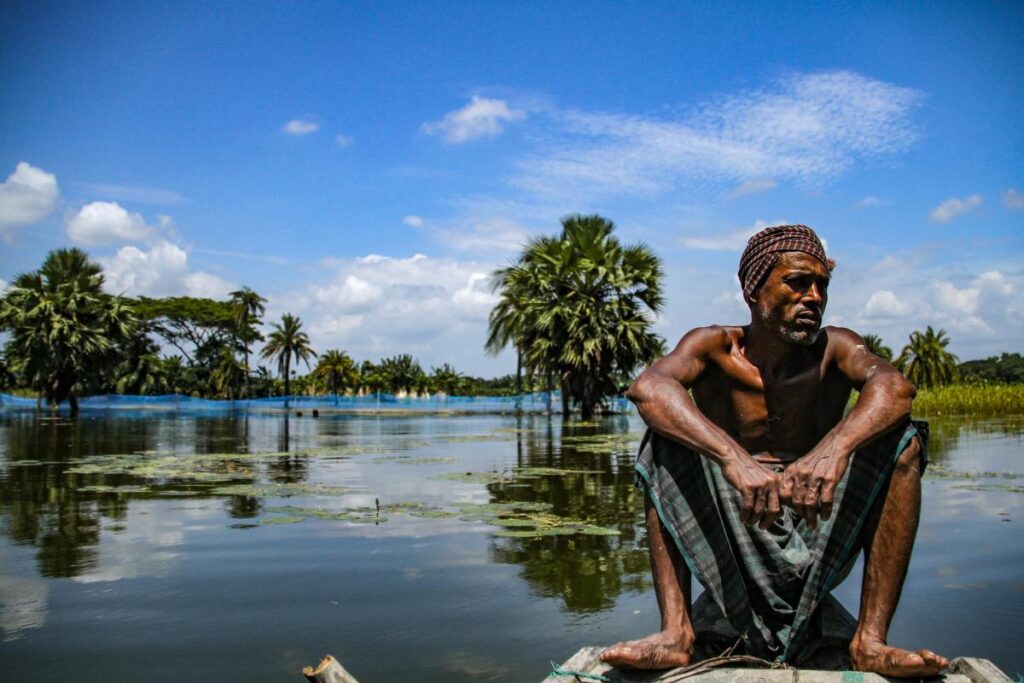In the southwest region of Bangladesh, the adverse effects of climate change and environmental degradation are displacing, or putting at risk, a growing number of people. Bangladesh is particularly vulnerable to the climate crisis. The coastal area of the Bay of Bengal faces rising seas, intensifying cyclones, severe flooding and extreme heat.
This project aims to equip communities in this region with the knowledge, skills, and access to finance and services to mitigate some of the worst impacts of climate change. The project is being implemented through funding provided by the EU Lives in Dignity (LiD) Grant Facility.
Scope and objectives
Satkhira Municipality, in Bangladesh’s southwest, is one of the most vulnerable in the country. Climatic hazards are a daily occurrence. The municipality had a population of just over 113 000 in 2011. By 2018, that population had risen to nearly 170 000. And that number continues to grow as people flee from areas severely impacted by ever-strengthening cyclones, which can leave land under water for as much as half the year.
For decades, seawater has invaded the low-lying lands of the region. Repurposing the land for shrimp farming seemed like a solution to this problem. But with saltwater escaping the shrimp ponds and increasing the salinity of the land, the possibilities for agricultural productivity have fallen. This has led to rising unemployment and other negative impacts for local communities. Forced to move into urban areas, most find refuge in urban slums, where women face an increased likelihood of gender-based violence.
This Lives in Dignity project is being implemented in two locations in Satkhira district, three unions in Shyamnager sub-district and five slums of Satkhira Municipality. It will target 3 500 people in 697 households in slum areas and 3,500 people in the Shyamnager sub-district.
The project aims to assist slum dwellers, primarily women, in Satkhira Municipality with the skills and technical and financial support to generate their own income. It will address limited access to basic services in the slums, and will seek to bolster education, water and sanitation services, while reducing the presence of water-borne diseases. This project will also seek to address the root causes of displacement, enhancing measures aimed at prevention and protection, and providing solutions for communities at risk of being displaced from the coastal region.
Expected results
Increased income generation and livelihood opportunities
- 390 displacement-affected people have increased skills and viable income-generating opportunities
Better access to rights and education, and improved disease prevention
- Representatives from climate migrant rights organisations are able to actively claim their rights as slum dwellers
- Children have better access to primary school enrollment; facilities for water and sanitation will be improved in schools and quality education will be provided in alignment with national primary education
- Cases of water-borne diseases have been reduced by enhancing facilities providing fresh water and improving sanitation for school-going children and slum communities
Enhanced solutions for disaster and climate-related displacement
- Risk-mitigation plans have been put in place for communities and slum dwellers at risk from future climatic shocks
- Communities at risk from the adverse effects of climate change and slum dwellers have been made aware of safe pathways for migration through the development of knowledge, skills, and livelihood diversity
- Actionable solutions for protection and prevention of future displacement have been piloted among at-risk climate-affected communities
Context
The EU-UNOPS Lives in Dignity Grant Facility was founded in 2020. The facility aims to promote development-oriented approaches and solutions to new, recurrent and protracted displacement crises. It funds innovative projects that support the resilience of communities and empower their members through livelihoods and basic services, making a concrete difference in the lives of displaced people.
This project will be jointly undertaken by international NGO, Education and Development Foundation, and local NGO, Uttaran. The sustainability of the project is enhanced as the partners have deep knowledge of the local context and communities, and the project will work closely with the local authority.
Implementing organisations
Uttaran and Education and Development Foundation – Educo

